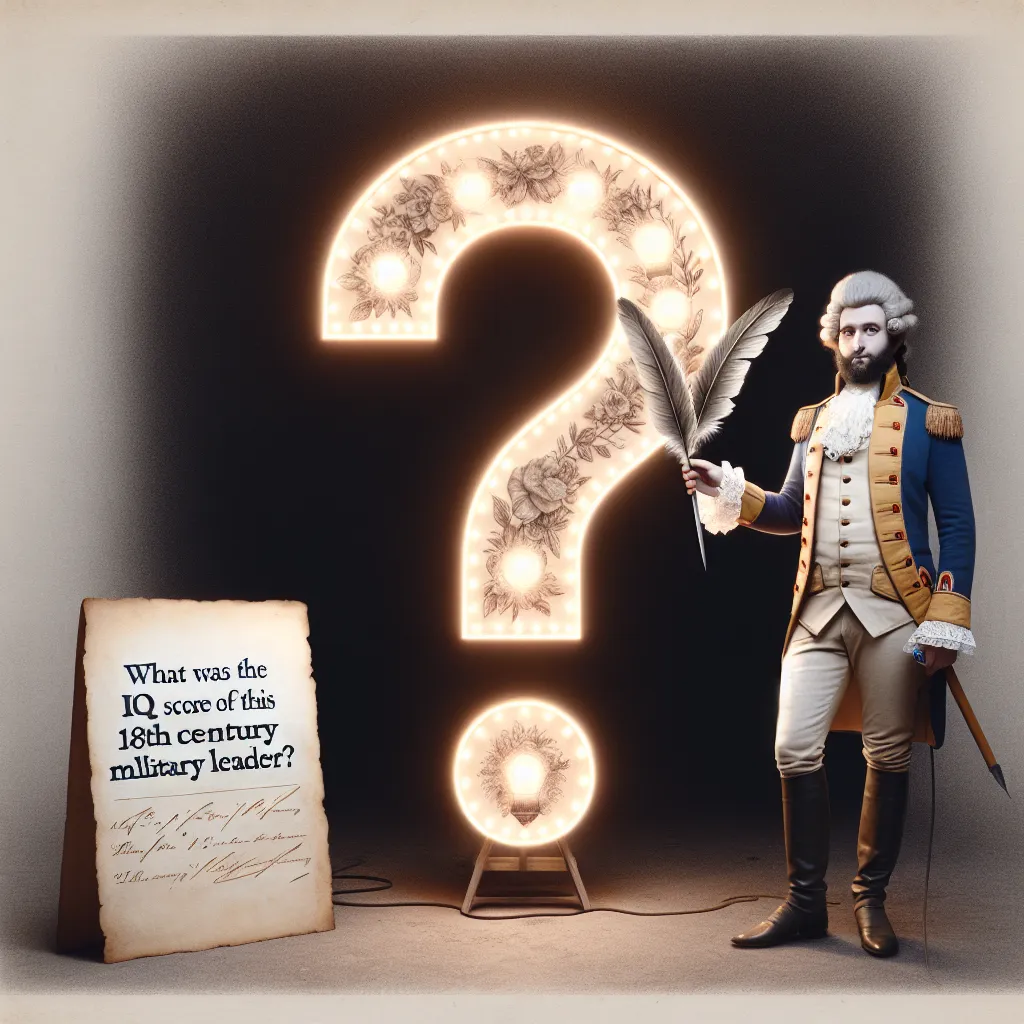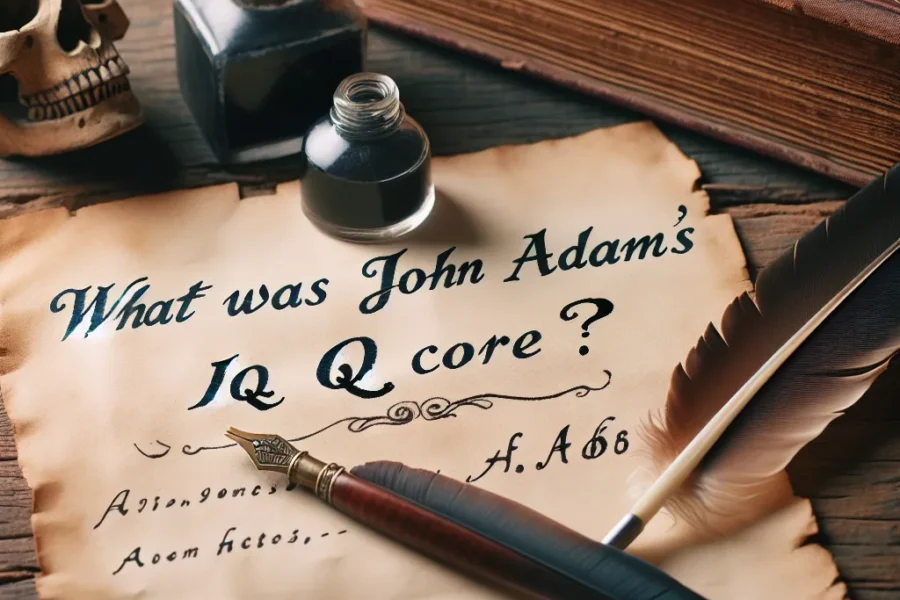When considering the intelligence of historical figures, few names evoke as much respect and admiration as George Washington. As the first President of the United States and a prominent figure in the American Revolutionary War, Washington’s leadership and decision-making capabilities were instrumental in shaping the early foundations of the United States. But what was George Washington’s IQ score? The quest to quantify the mental prowess of this iconic leader is an intriguing one, as it delves into the history, the limitations of intellectual assessments, and the nature of human intelligence itself.
If you are looking for legitimate IQ Tests which pass the entry bar for Mensa, see our IQ Tests.
Firstly, it is crucial to clarify that George Washington never took an IQ test. The concept of measuring intelligence through a standardized test was not developed until the early 20th century, long after Washington’s time. The first modern intelligence test was created by Alfred Binet and Théodore Simon in 1905. The IQ (Intelligence Quotient) score as we know it was defined later by William Stern and others. Therefore, any numbers or scores associated with Washington’s IQ are purely speculative.
Despite the absence of an official IQ score, it is possible to gather insights into Washington’s intelligence by examining his life, achievements, and the qualities that he demonstrated throughout his career. Born into a colonial Virginia family in 1732, George Washington grew up in an environment that valued hard work, discipline, and self-reliance. Although he did not receive formal education equivalent to that of some of his contemporaries, Washington was an autodidact who continually sought to expand his knowledge and skills.
Washington’s intellectual abilities were evident in several areas. His military career, for instance, showcased not only his tactical and strategic acumen but also his ability to learn and adapt. During the French and Indian War, young Washington gained invaluable experience despite facing numerous challenges and setbacks. He demonstrated an aptitude for leadership and an ability to inspire and command respect from his troops.
Washington’s role as Commander-in-Chief of the Continental Army during the American Revolutionary War further solidified his reputation. The Revolutionary War was a prolonged and challenging conflict that required astute leadership, resilience, and an unwavering commitment to the cause. Washington’s successful crossing of the Delaware River in 1776 and his victory at the Battle of Trenton were both masterful examples of military strategy and innovative thinking under pressure.
Moreover, George Washington’s intelligence extended beyond the battlefield. In the realm of politics, he displayed a keen understanding of governance, diplomacy, and human nature. When the war concluded, Washington could have seized power, but instead, he chose to return to his life as a private citizen, earning him admiration and reinforcing his legacy as a selfless leader devoted to democratic principles.
Washington’s contribution to the Constitutional Convention of 1787 was another testament to his intellect. He presided over the convention, playing a crucial role in the creation of the United States Constitution. His support for a strong but balanced federal government showcased his foresight and understanding of the complexities involved in creating a sustainable and functional system of governance.
Washington’s two terms as President further highlight his intelligent statesmanship. Navigating the nascent nation’s challenges required diplomatic tact, an understanding of economics, and an ability to balance competing interests. His establishment of a stable financial system, including the support for Alexander Hamilton’s fiscal policies, demonstrated his pragmatic approach and appreciation for economic principles.
Additionally, Washington’s Farewell Address, which he penned with the assistance of Alexander Hamilton and James Madison, is a remarkable document that reflects his wisdom and foresight. In it, he articulated critical advice for future generations, warning against political factionalism, foreign alliances, and the dangers of sectionalism. His insights remain relevant and are often cited by modern scholars and leaders.
Given these accomplishments, it is reasonable to conclude that George Washington possessed a high degree of intelligence, encompassing strategic thinking, leadership qualities, emotional intelligence, and practical wisdom. While traditional IQ tests focus on specific cognitive abilities such as logical reasoning, mathematical skill, and verbal prowess, they may not fully capture the breadth of Washington’s intellectual capabilities.
The challenges in estimating Washington’s IQ are compounded by the differences in historical context and educational opportunities compared to the present day. Education in the 18th century was markedly different from contemporary standards, and individuals like Washington often relied heavily on self-education and practical experience. Despite these limitations, Washington’s success across various domains suggests he would score highly on an IQ test if he were to take one today.
While some historians and biographers have attempted to estimate historical figures’ IQ scores using various methods, these estimates are inherently speculative. For example, Washington’s contemporaries such as Thomas Jefferson and Benjamin Franklin are often speculated to have high IQs due to their extensive writings, inventions, and intellectual contributions. Washington, with his distinct set of achievements, would likely be placed in a similar category.
In addition to examining Washington’s life and accomplishments, it is also worth exploring the broader concept of intelligence. Modern views on intelligence recognize its multifaceted nature, going beyond the traditional confines of IQ tests. Psychologist Howard Gardner’s theory of multiple intelligences, for instance, suggests that intelligence includes linguistic, logical-mathematical, spatial, musical, bodily-kinesthetic, interpersonal, intrapersonal, and naturalistic abilities.
Applying Gardner’s framework to Washington’s life, one could argue that he exhibited a high degree of interpersonal intelligence through his leadership and ability to motivate and manage people effectively. His intrapersonal intelligence, or self-awareness, was evident in his disciplined lifestyle and reflective decision-making processes. His strategic military skills and political acumen point to strong logical-mathematical and spatial intelligences.
Furthermore, emotional intelligence, a concept popularized by psychologists such as Daniel Goleman, can also be seen in Washington’s ability to remain composed under pressure, his empathy towards his soldiers and fellow citizens, and his capacity to forge and maintain alliances. These traits were crucial in his role as both a military leader and a president and are indicative of a broad and deep form of intelligence.
George Washington’s legacy, therefore, cannot be confined to a numerical IQ score. His contributions to American society and his enduring influence are the results of a complex interplay of intellectual abilities, character, and circumstances. The lack of a formal education did not hinder his quest for knowledge, and his commitment to self-improvement is a testament to his intellectual curiosity.
In conclusion, while we cannot definitively state George Washington’s IQ score, we can appreciate the breadth and depth of his intelligence through his remarkable achievements and enduring legacy. His life embodies the idea that true intelligence transcends test scores and encompasses practical wisdom, emotional resilience, leadership qualities, and a commitment to lifelong learning. Washington’s multifaceted intelligence, combined with his fortitude and vision, solidified his place as one of the most revered figures in American history. Whether on the battlefield, in the political arena, or in personal conduct, George Washington’s intelligence continues to inspire and teach valuable lessons in leadership, governance, and human potential.



Leave a Comment